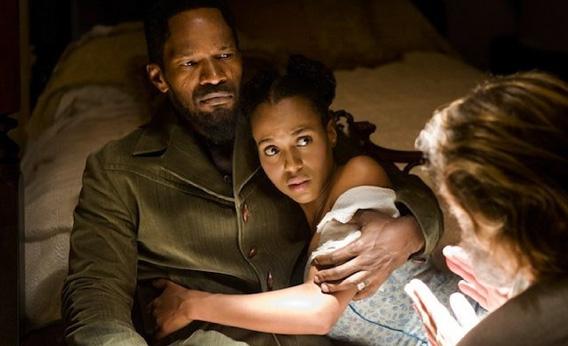
Jamie Foxx and Kerry Washington in Django Unchained.
The Weinstein Company.
In the opening scene of Quentin Tarantino?s antebellum Western Django Unchained, a slave named Django is set free by a German bounty hunter who needs his help finding an outlaw. In dramatic slow motion, Django tosses off the thin, raggedy blanket that?s been protecting him from the chilly evening, revealing a tangle of whipping scars on his back. The image is a powerful one, and it marks the beginning of Django?s transformation from helpless slave to avenging hero.
In creating his ?Southern? (as opposed to Western), Tarantino was drawn to what he?s called ?the most violent, surreal, and pitiless landscape of any director in the history of the genre??the spaghetti Westerns made by Italian director Sergio Corbucci and in particular Django, starring Franco Nero. Corbucci?s influence isn?t hard to trace: Django Unchained features a similar tale of vengeance, the same great theme song (performed by Roberto Fia), and even a cameo by Nero himself. By making its hero a former slave, Tarantino?s film also evokes a trilogy of blaxploitation Westerns dating from the early 1970s, all starring the football-player-turned-actor Fred Williamson: The Legend of Nigger Charley (1972), The Soul of Nigger Charley (1973), and Boss Nigger (1975). But while Jamie Foxx?s Django delivers his fair share of bloody comeuppances to various white evil-doers, Tarantino?s movie is far less radical in its depiction of slavery?and vision of black power?than its blaxploitation forebears. Revisting those 1970s films reminds the viewer just how revolutionary blaxploitation films could be.
The first two Williamson films tell the story of ?Nigger Charley,? an escaped slave who, together with his reluctant but loyal sidekick Tobey (D?Urville Martin), conquers the Old West on horseback. By the time of the second film, set during Reconstruction, Charley?s reputation as a gunslinger precedes him, and he?s won the respect of blacks and even some whites. In the final film, Boss Nigger, an only loosely connected installment, Williamson and Martin team up again as bounty hunters Boss and Amos, ditching their slave backgrounds altogether in a decidedly more defiant production.
Like Django Unchained, the trilogy offers slaves a chance to slip from their chains and enact a measure of revenge for their bondage. In The Legend of Nigger Charley, three runaway slaves?Charley, Tobey, and Joshua (Don Pedro Colley)?miraculously manage to fend off the sheriff and his posse who chase them from the plantation after they murder their slaveholder and make their escape. The central plot line of The Soul of Nigger Charley revolves around Charley and Tobey enlisting the help of other ex-slaves to fight against Col. Blanchard and Gen. Hook, men who have vowed to restore the Confederacy to its glory days. ?We ain?t never gonna be free so long as black people are slaves,? Charley says to his hesitant compatriots.
Such racial solidarity is noticeably absent from Django Unchained. Django (Jamie Foxx) possesses a focused drive to find and free his wife, Broomhilda (Kerry Washington). He takes out a few slavers along the way, but his efforts to save his wife often run counter to the interests of the blacks around him. In order to deceive Calvin Candie (Leonardo DiCaprio), Broomhilda?s new owner, Django must play the part of an expert in ?Mandingo fighting??fights in which slave owners pitted their strongest slaves against one another in fights to the death. (Mandingo fighting was the subject of another blaxploitation film; it is unclear whether this was actually a common practice during slavery.) Django must prove that he can be just as ruthless toward slaves as the slave owners themselves, and in one of the movie?s most difficult scenes to watch, he refuses to let his companion, Dr. Schultz (Christoph Waltz), buy one of Candie?s runaway fighters to save him from death. Django thus encourages Candie to deal with the slave as he sees fit; he looks on dispassionately as the slave is ripped to shreds by dogs.
The three Williamson Westerns were all directed by white men, but compared with Django Unchained, the blaxploitation movies feel like the more radical films. Charley wins his freedom by killing his master and escaping the plantation. In Tarantino?s movie, by contrast, Django tries and fails to escape and is only liberated, and empowered, by the benevolent bounty hunter Dr. Schultz.
And consider two similar scenes in Django Unchained and The Legend of Nigger Charley. Early in Tarantino?s movie, Dr. Schultz and the newly liberated Django enter a Texas settlement to the bafflement of the white townspeople. Django explains to Schultz (a German) why they?re acting so strange??niggers? don?t ride horses, and they definitely aren?t served in saloons. For Django, white people present a persistent threat; entering white spaces like a saloon or a plantation can cost him his life. He?s able to navigate those spaces mainly because he has the protection of a white man. In The Legend of Nigger Charley, Charley and Tobey have no such protection, and yet they aren?t run out of town, or killed instantly, when they ride into the white Old West. It?s not that they don?t face racism?a white stableman claims he has no room for ?niggers?? horses?but the movie imagines a world in which they can take such prejudices and turn them on their head with no consequences. (Charley sternly advises the stableman that his money is ?white? and he won?t take no for an answer.) When Django and Schultz visit a saloon in that Old West town, they escape with their lives only because of Schultz?s lawyerly explanation that they?re there on official law enforcement business. When Charley and Tobey walk into a saloon, Charley beats up a racist patron and the rest of the barflies exit, out of fear, without a fight.
A similar scene occurs in Boss Nigger, only it?s even more subversive. Whereas in Legend, Williamson?s character is only looking to stay out of trouble and away from the sheriff , in Boss, he and Amos enter an equally white settlement with the intention of installing themselves as sheriff and deputy?in order to claim their bounty on a band of outlaws, who are secretly in cahoots with the town mayor. They accomplish their goal with ease. Again, in the style of blaxploitation, a situation that in real life likely would have resulted in Boss and Amos?s immediate lynching instead proves opportunistic: They create a set of rules for the town (among them: a fine for calling them a ?nigger? in public) and jail anyone who defies their rules.
With noticeably higher production values, all-black leather cowboy gear reminiscent of John Shaft, and more buffoonish characterizations of white characters (most of whom seem incapable of operating a gun), Boss Nigger comes closest to the hip, sly style of Tarantino. And like Django, Boss and Amos are bounty hunters who revel in their line of work. (?You all been hunting black folks for so long,? Amos tells the mayor, ?we just wanna see what it felt like to hunt white folks.?) But unlike Tarantino?s hero, they are also concerned with protecting the vulnerable, including a young black woman and the Mexican settlement terrorized by the outlaws? gang.
Of course, these blaxploitation movies had a different aim than Tarantino necessarily does in Django. Made at a moment when Hollywood was finally recognizing black audiences as an untapped market, the point was to give hope, however fantastical, to those viewers. In offering up more black faces in positions of self-made power, the movies served as a clear alternative to the often passive portrayals in films starring the likes of Harry Belafonte and Sidney Poitier in the ?50s and ?60s. Django Unchained offers its own slave-revenge fantasy, but it sticks closer to the more conventional aspects of the Western than any of Williamson?s films do?in Tarantino?s world, the outcast individual is mostly in it for himself; he?s not standing up on behalf of his fellow subjugated man. You can choose to identify with Django, but if you do, you?re rooting for his overcoming of oppression, not a collective victory for the black race.
Boss Nigger was written and produced by Williamson, the first of many such credits in what would prove to be a long career. His new level of control in Hollywood mirrored that of the black Western hero he played: As the movie?s writer, he, like Boss, could craft any image he desired. In an insightful interview, Williamson described his demands for every movie he?s ever made in Hollywood: 1) he can?t be killed off; 2) he must win all of the fights; and 3) he gets the girl in the end, if he wants to. ?It was a period in American black history, where we needed heroes,? he said. ?We were the beginning of the tough guy, the winner, the black hero. When the smoke cleared, we were the ones left standing. That was something that was needed at that time, and I was very conscious of that.? Williamson?s trilogy may not have been as technically or narratively slick as Django Unchained, but those films also weren?t afraid to make their protagonist an agent of his own change.
Source: http://feeds.slate.com/click.phdo?i=eab0352faa8a6fb59752f88835cf51d4
tim thomas oral roberts les paul fred thompson fred thompson red hook romney tax return
 You are welcome to download?it?here. You can even send a copy (in PDF, ePub or Mobipocket format) to your relatives or friends across the world, maybe as a present for their donation to GV. Most important, please spread the word in your global circles, social networks and anywhere you deem fit!
You are welcome to download?it?here. You can even send a copy (in PDF, ePub or Mobipocket format) to your relatives or friends across the world, maybe as a present for their donation to GV. Most important, please spread the word in your global circles, social networks and anywhere you deem fit!







 The internet and social media have together created huge challenges for businesses over the past decade ? and it?s not just marketing departments that have been affected: companies have had to adapt every area in their organisation, including sales, customer service and recruitment.
The internet and social media have together created huge challenges for businesses over the past decade ? and it?s not just marketing departments that have been affected: companies have had to adapt every area in their organisation, including sales, customer service and recruitment.
